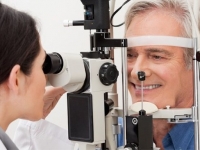Inflammation of the eye vessels
 Tired eyes, flies, or sharply dropped vision can be signs of problems with eye vessels. After all, the eyes, like any organ, have a choroid. In ophthalmic practice, inflammatory processes of the choroid are quite common and are united by the general term uveitis. Depending on the form of the pathology, the inflammatory process in the eyes is called differently: today we will speak about chorioretinitis.
Tired eyes, flies, or sharply dropped vision can be signs of problems with eye vessels. After all, the eyes, like any organ, have a choroid. In ophthalmic practice, inflammatory processes of the choroid are quite common and are united by the general term uveitis. Depending on the form of the pathology, the inflammatory process in the eyes is called differently: today we will speak about chorioretinitis.
Why does the ocular choroid become inflamed
Vascular network of the eyeball has many branches. Thus, the term uveitis is derived from the Greek word “ua” – grape, because the choroid resembles a bunch of grapes. Choioritis is an inflammation of the choroid, the sheath of the posterior part of the eyeball. The branched structure of the vascular ophthalmic membrane contributes to the retention in them of various bacteria and viruses circulating in the body and carried with the bloodstream.
In this case, an infectious form of the disease develops. Triggers of the disease often relieve stress, hypothermia, lack of sleep, poor nutrition and poor nutrition. Often chorioretinitis occurs against the background of influenza, acute respiratory viral infections, otitis, as a complication. There may also be chorioretinitis of an allergic nature or the consequences of an eye injury.
Signs of choroidal inflammation
Inflammation in the choroid may not manifest itself. Symptoms begin to occur when the retina is affected. One of the symptoms characteristic of chorioretinitis is the occurrence of so-called outbreaks before the eyes. Also, the inflammatory process in the vascular ophthalmic membrane may occur:
Irritated eyes from bright light
Flickering “fly”
Twilight Impairment
Pain in the eyes of a pulling character
Tearing.
Prevention of inflammatory diseases of the eye vessels
If chorioretinitis is not treated, then the illness can provoke a sharp decrease in vision, even to its loss. Regular preventive examinations at the ophthalmologist (at least once a year) will help to identify eye diseases at an early stage, when symptoms have not yet appeared – and successfully cure them. It is also important to promptly treat any infectious disease, even a “harmless” ARVI. An important factor is good nutrition, the use of vitamins, good rest, including for the eyes. Do not overload your eyesight, take care of your eyes when working at a computer, from sunlight, etc.
In case of any unpleasant sensations, symptoms, pain in the eyes, decreased vision, etc. – do not postpone visit to the ophthalmologist. If the inflammatory process in the vascular ophthalmic membrane has contributed to infection, then a series of examinations will be required to ensure proper and effective treatment. Self-treatment with folk methods will give only short-term results and remove the symptoms, but not the very cause of the disease. And chronic running conditions are much worse treatable.



